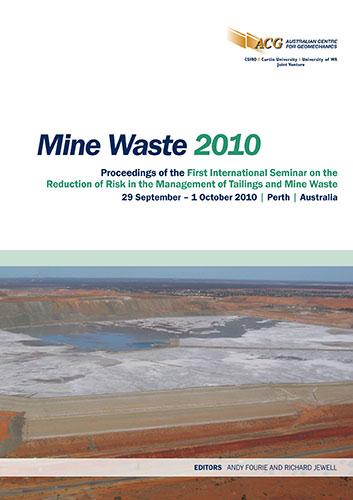The importance of selecting appropriate compliance and completion criteria during the initial stages of tailings storage facility design

|
Authors: Chapman, PJ; Williams, DA |
DOI https://doi.org/10.36487/ACG_rep/1008_26_Chapman
Cite As:
Chapman, PJ & Williams, DA 2010, 'The importance of selecting appropriate compliance and completion criteria during the initial stages of tailings storage facility design', in R Jewell & AB Fourie (eds), Mine Waste 2010: Proceedings of the First International Seminar on the Reduction of Risk in the Management of Tailings and Mine Waste, Australian Centre for Geomechanics, Perth, pp. 297-308, https://doi.org/10.36487/ACG_rep/1008_26_Chapman
Abstract:
The potential for environmental impacts and long-term legacies of mining is well documented. However, there appears to be resistance by many industry figures, including mining companies, consultants and regulators, to develop appropriate compliance and completion criteria during the design stage, with the objective of reaching an appropriately and optimally designed facility that is economically, environmental and technically feasible. This paper presents an approach to developing compliance and completion criteria that will facilitate the identification of appropriate design objectives. The objectives can be based on an agreed final landform, mining company standards and long-term legacy to the community. Examples are presented in which air, water and ground issues are explored, including seepage into fresh groundwater and hypersaline groundwater, erosion and water management, as well as dust. As part of each worked example, potential outcomes are presented based on a range of different compliance criteria. This paper also presents a tool that can be used to identify the preferred tailings management solution, based on the identified and agreed compliance and completion criteria.
References:
ANCOLD (1998) Australian National Committee on Large Dams, Guidelines for Design of Dams for Earthquakes,
August 1998.
ANCOLD (1999) Australian National Committee on Large, Guidelines on Tailings Dam Design, Construction and
Operation, October 1999.
May 2010.
BHP Billiton (2006) BHP Billiton Sustainability Report 2006, Environment, Our Approach, Waste Rock and Tailings,
2010.
Bray, J.D. and Travasarou, T. (2009) Pseudostatic Coefficient for Use in Simplified Seismic Slope Stability Evaluation,
Journal of Geotechnical and Geoenvironmental Engineers, Volume 135, Issue 9, pp. 1336–1340.
Chadwick, M.J., Highton, N.H. and Lindman, N. (1986) Environmental impacts of coal mining and utilization,
Pergamon Books Inc., Elmsford, NY, 450 p.
Department of Environment and Conservation (DEC) (2005) Approved Methods and Guidance for the Modelling and
Assessment of Air Pollutants in NSW.
The importance of selecting appropriate compliance and completion criteria during the P.J. Chapman and D.A. Williams
initial stages of tailings storage facility design
308 Mine Waste 2010, Perth, Australia
Department of Minerals and Energy (DME) (1999) Guidelines on the Safe Design and Operating Standards for Tailings
Storage, Department of Minerals and Energy, Western Australia.
Department of Minerals and Energy (DME) (2000) Water Quality Protection Guidelines No. 3, Mining and Mineral
Processing, Liners for waste containment, Department of Minerals and Energy, Western Australia.
Department of Mines and Petroleum (DMP) (2007) Mining Proposal in Western Australia, Environmental Division,
Minerals Branch, Department of Industry and Resources, Western Australia.
Doran, G.T. (1981) There's a S.M.A.R.T. way to write managements's goals and objectives, Management Review,
November 1981, Volume 70, Issue 11.
Gray, N.F. (1997) Environmental impact and remediation of acid mine drainage: a management problem,
Environmental Geology, Volume 30, pp. 62–71.
Hynes, M.E. and Franklin, A.G. (1984) Rationalizing the Seismic Coefficient Method, U.S. Department of the Army,
Waterways Experiment Station, U.S. Army Corps of Engineers (USACE), Miscellaneous Paper GL 84 13.
Kramer, S.L. (1996) Geotechnical Earthquake Engineering, Prentice Hall, Inc., Upper Saddle River, New Jersey, 653 p.
Lottermoser, B.G. (2007) Mine Wastes: characterization, treatment and environmental impacts, 2nd Edition, Spring
Berlin Heidelberg, New York, 277 p.
Mining Association of Canada (MAC) (1998) A Guide to the Management of Tailings Facilities, September 1998,
Morrison, K., Elliot, J., Johnson, J. and Monok, B. (2008) Uranium tailings facility design and permitting in the modern
regulatory environment, in Proceedings Tailings and Mine Waste '08, Taylor and Francis Group, London,
pp. 205–313.
IMS-PL 2002 Environment Endorsed Policy Regional.pdf, accessed 25 May 2010.
Vick, S.G. (1990) Planning, Design, and Analysis of Tailings Dams, John Wiley and Sons.
© Copyright 2026, Australian Centre for Geomechanics (ACG), The University of Western Australia. All rights reserved.
View copyright/legal information
Please direct any queries or error reports to repository-acg@uwa.edu.au
View copyright/legal information
Please direct any queries or error reports to repository-acg@uwa.edu.au